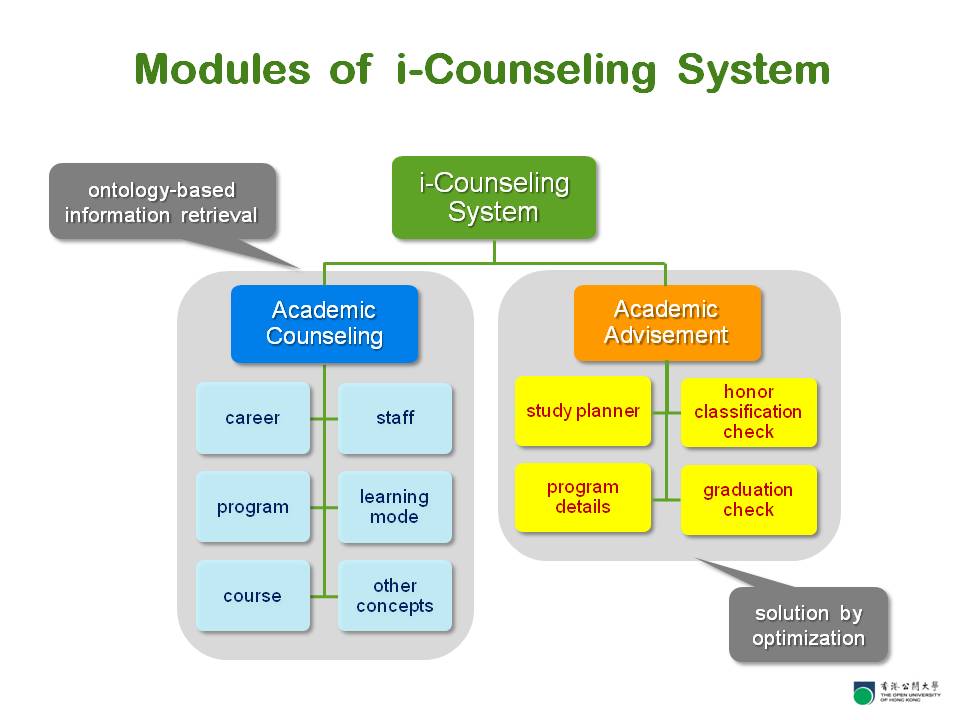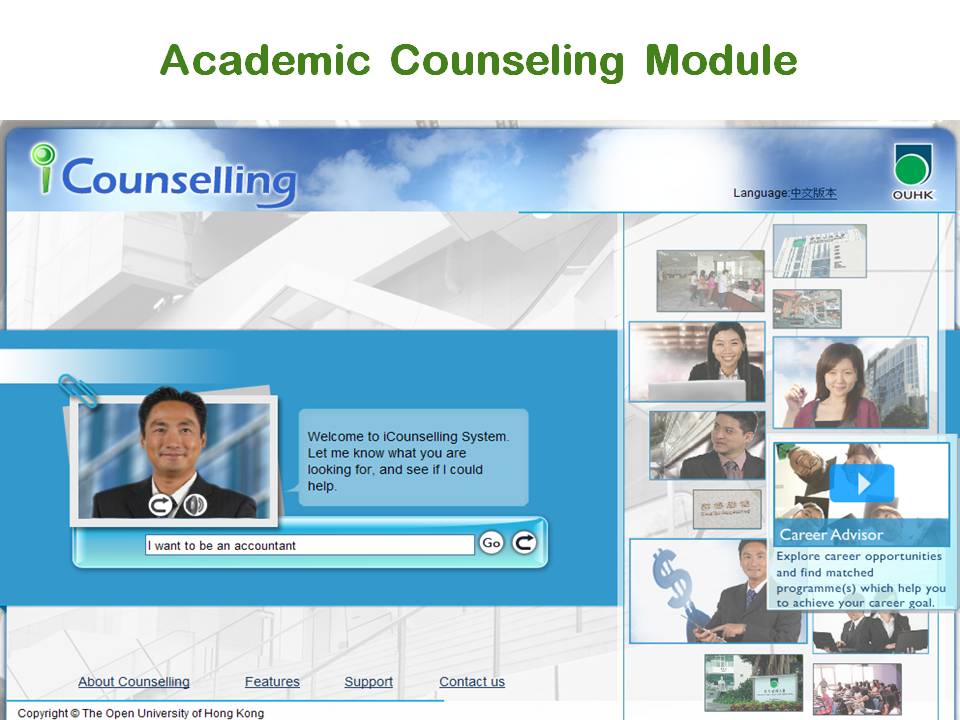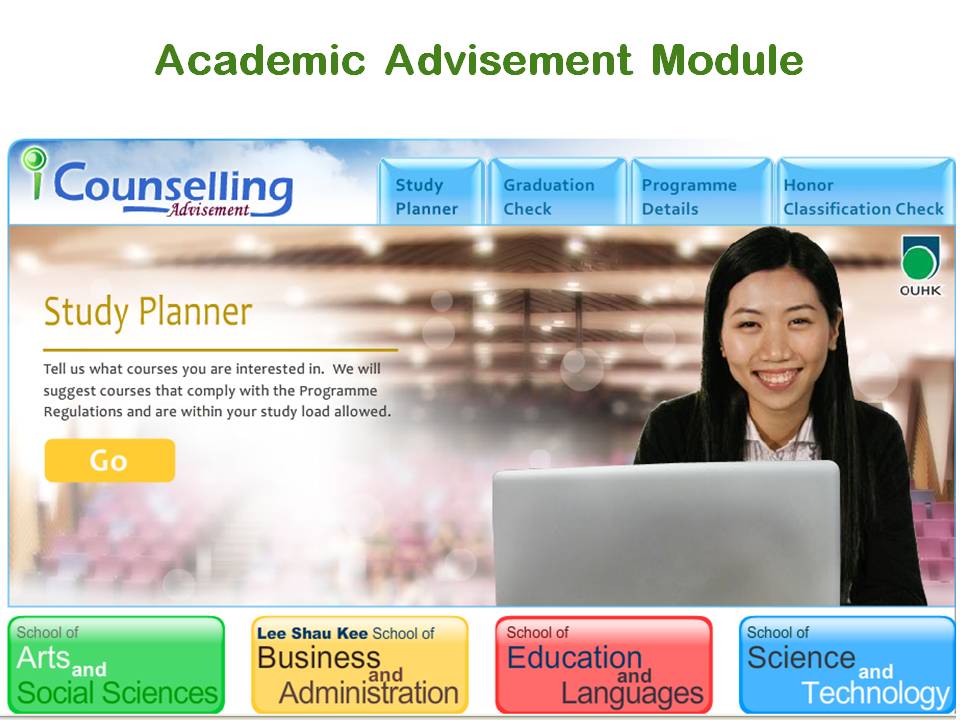Key Takeaways
- Universities are increasingly looking into self-service systems with intelligent digital agents to supplement or replace labor-intensive services, such as academic counseling.
- The Open University of Hong Kong has developed an intelligent online system that instantly responds to enquiries about career development, learning modes, program/course choices, study plans, and graduation checks.
- The online system uses an animated character with multilingual, text-to-speech, and natural language capabilities as a front end for sophisticated search and information retrieval.
Universities worldwide are increasingly pressed to offer services to more students with less resources and fewer staff members. In this situation they are developing self-service, web-based systems sophisticated enough to handle routine and higher level questions, such as those for academic counseling and advisement. The Open University of Hong Kong (OUHK) has prototyped an innovative system that combines an ontology-based information retrieval engine, a guided search engine, and a mathematical optimization solver to provide relevant responses to queries on academic counseling, thereby offering users a better enquiry experience and 24 × 7 accessibility.
Background and Project Motivation
The OUHK was established by the Hong Kong Government in 1989 as a self-financed institution providing higher education to adults through open learning. It offers three study modes: distance learning for working adults (about 13,000 enrolled); full-time, face-to-face teaching for traditional higher education students (about 5,600 enrolled); and e-learning for some postgraduate studies (about 340 enrolled). It offers 210 subdegree and degree programs involving over 700 courses, of which about 440 are in distance learning mode.
For distance learning, the university has an open admission policy (anyone 17 years or older is admitted regardless of their previous academic qualifications) and a credit accumulation system for studies, with no time limit for degree completion. Except for occasional face-to-face tutorial sessions for which attendance is not mandatory, distance learning students do not come to campus for their studies because there is no in-class instruction. Since most OUHK distance learning students are working adults with careers and families, they generally expect 24 × 7 access to information, prompt responses to enquiries, and flexibility in conducting business with the university with minimal campus visits. To efficiently and cost effectively service these needs, OUHK established a call center to handle enquiries via phone, web chat, e-mail, and fax. Online FAQs provide answers to common questions.
In contrast, academic counseling questions are not easy for call center systems or FAQs to handle. Prospective students have complex questions such as, Which programs or courses are suitable for my career development? Can OUHK recognize my previous academic qualifications? Which programs/courses should I take to pursue a certain career? Such questions often require campus visits and face-to-face communication with academic staff, which are time-consuming and labor-intensive. Hence, the challenge was to provide an effective 24 × 7 academic counseling service to help prospective and current students plan their studies.
The i-Counseling System
For this purpose, the OUHK has developed, as a prototype, an intelligent counseling system (the i-Counseling System) under the Center for Innovation initiative funded by the Hong Kong Government. The goal of the initiative is to develop a next-generation, student-centered learning environment that blends the strengths of distance learning, face-to-face teaching, and online learning. The system can provide 24 × 7 online counseling services to prospective and current students by simulating the role of a teacher/advisor when responding to enquiries in areas such as career guidance and development, study paths and methods, and program/course choices. For current students who are planning their study toward graduation, the system also lets them perform a preliminary graduation check, find the number of outstanding credits, and suggest required courses based on student preferences.
The i-Counseling System has two modules: academic counseling and academic advisement. The academic counseling module handles general queries from prospective students, on questions about career development, program/course information, and learning modes. The academic advisement module deals with specific questions mostly from current students, on program specifics, study plans, and graduation checks. For a demonstration of the i-Counseling System, see the video clip linked to Figure 1 (click over the image to follow the link).
Figure 1. Two Modules of the i-Counseling System
As demonstrated in the video clip, the i-Counseling System has several innovative features:
- Intelligent search via an ontology-based information retrieval engine to locate the most relevant information
- Guided search via an administered search engine to provide step-by-step guidance derived from the relevant information of different areas
- A mathematical optimization solver to find a solution that matches course selection preference with academic program requirements
- A smart user interface that employs a digital agent with multilingual, text-to-speech, and natural language capabilities to handle the query process
The next section describes these design concepts and features.
Design Concepts of the i-Counseling System
The two modules of the i-Counseling System differ not only in their functions but also in the ways they were designed. The academic counseling module uses an ontology-based information retrieval engine to suggest relevant information to students, while the academic advisement module optimizes the choices concerning study planning, graduation check, and so on. Presentations linked to Figure 2 (for the academic counseling module) and Figure 3 (for the academic advisement module) briefly explain the design concepts and technology frameworks of these two modules.
Figure 2. Academic Counseling Module
Figure 3. Academic Advisement Module
Challenges and Outlook
The major challenges in developing this system were the following:
- Academic counseling requires accurate answers and reliable responses to searches and queries, so an incorrect answer or misleading result can have dire consequences for students.
- Ontology-based search is still an emerging discipline, with new ideas introduced constantly.
- It is difficult to verify and maintain the domain ontology as new and modified classes, individuals, attributes, and relations are introduced.
- Constructing the required domain ontology from multiple data sources with unstructured information is a daunting task.
- Academic counselors generally lack the technical skills to develop the flows for guided searches.
Despite these challenges, we have developed a prototype system that will be launched soon. With continued refinement of the system's domain knowledge, its intelligence and accuracy should improve. When the system is fully operational, staff responsible for academic counseling will handle only complex enquiries from prospective and current students, leaving common queries to the i-Counseling System. Then this self-service system will help optimize staff deployment and improve academic counseling services.
Acknowledgment
This article is based on a presentation with the same title given at the 2010 EDUCAUSE Annual Conference in Anaheim, California, October 12–15, 2010.
© 2010 Chun Ming Leung, Eva Y. M. Tsang, S. S. Lam, and Dominic C. W. Pang. The text of this article is licensed under the Creative Commons Attribution-Noncommercial-No Derivative Works 3.0 license.



